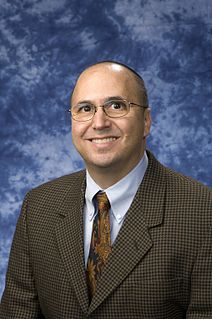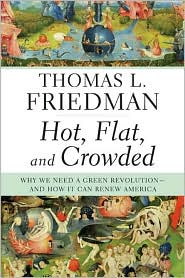Greg Craven is an American high school science teacher and climate change author. The creator of a 2007 viral video on YouTube, he is the author of the 2009 book What's the Worst That Could Happen?: A Rational Response to the Climate Change Debate.
Craven grew up in Silverton, Oregon. He earned a bachelor's degree from the University of Puget Sound in Tacoma, Washington, studying Asian studies and computer science. [1]
After graduating from college, Craven worked as a software engineer, traveled in Asia, and took graduate science courses at the University of Washington in Seattle. [2]
In 2007, when he was a science teacher at Central High School in Independence, Oregon, Craven posted the nine and one-half minute The Most Terrifying Video You'll Ever See [3] on YouTube. The video presented a simplified version of risk management using a 2x2 grid to sketch out possible scenarios based on: a) whether we choose to take action or not, and b) whether global warming turns out to be a threat or not. Using the grid, Craven concluded that taking action to combat climate change was the better choice, given the relative risks.
In the first six months online it garnered four million hits, and prompted Craven to spend six weeks creating 44 follow up videos totaling over seven hours detailing specifics of risk management applied to climate change. [4] Craven's conclusion was that "the risk of not acting far outweighs the risk of acting." [5] Craven was the focus of some media attention, [6] was named "Featured Teacher" by WIRED Science , [7] and was opposed by climate change denialists. In 2009, Craven published the book What's the Worst That Could Happen?: A Rational Response to the Climate Change Debate. [8]
At the annual Fall Meeting of the American Geophysical Union (AGU) in 2010, Craven delivered a speech [9] (and subsequent comments during a panel discussion) exhorting the climate science community to become personally involved in the public debate over climate change. Craven's comments caused some negative attention in denialist climate blogs, which argued that Craven was "the face of the 'New AGU.'" [10] This prompted Craven to publish a clarification taking personal responsibility and emphasizing that his remarks were in no way associated with the AGU organization or its official view. [11]

Siegfried Fred Singer was an Austrian-born American physicist and emeritus professor of environmental science at the University of Virginia, trained as an atmospheric physicist. He was known for rejecting the scientific consensus on several issues, including climate change, the connection between UV-B exposure and melanoma rates, stratospheric ozone loss being caused by chlorofluoro compounds, often used as refrigerants, and the health risks of passive smoking.

The global warming controversy concerns the public debate over whether global warming is occurring, how much has occurred in modern times, what has caused it, what its effects will be, whether any action can or should be taken to curb it, and if so what that action should be. In the scientific literature, there is a strong consensus that global surface temperatures have increased in recent decades and that the trend is caused by human-induced emissions of greenhouse gases. No scientific body of national or international standing disagrees with this view, though a few organizations with members in extractive industries hold non-committal positions, and some have attempted to convince the public that climate change is not happening, or if the climate is changing it is not because of human influence, attempting to sow doubt in the scientific consensus.

There is a strong scientific consensus that the Earth is warming and that this warming is mainly caused by human activities. This consensus is supported by various studies of scientists' opinions and by position statements of scientific organizations, many of which explicitly agree with the Intergovernmental Panel on Climate Change (IPCC) synthesis reports.

The George C. Marshall Institute (GMI) was a nonprofit conservative think tank in the United States. It was established in 1984 with a focus on science and public policy issues and had an initial focus in defense policy. Starting in the late 1980s, the institute advocated for views in line with environmental skepticism, most notably climate change denial. The think tank received extensive financial support from the fossil fuel industry.

An Inconvenient Truth is a 2006 American documentary film directed by Davis Guggenheim about former United States Vice President Al Gore's campaign to educate people about global warming. The film features a slide show that, by Gore's own estimate, he has presented over 1,000 times to audiences worldwide.
Benny Josef Peiser is a social anthropologist specialising in the environmental and socio-economic impact of physical activity on health. He was a senior lecturer in the School of Sport and Exercise Sciences at Liverpool John Moores University (LJMU) and is a visiting fellow at the University of Buckingham.
The Stern Review on the Economics of Climate Change is a 700-page report released for the Government of the United Kingdom on 30 October 2006 by economist Nicholas Stern, chair of the Grantham Research Institute on Climate Change and the Environment at the London School of Economics (LSE) and also chair of the Centre for Climate Change Economics and Policy (CCCEP) at Leeds University and LSE. The report discusses the effect of global warming on the world economy. Although not the first economic report on climate change, it is significant as the largest and most widely known and discussed report of its kind.

The Rational Response Squad, or RRS, is an atheist activist group that confronts what it considers to be irrational claims made by theists, particularly Christians. The most visible member of RRS is co-founder Brian Sapient. The Rational Response Squad, along with the filmmaker Brian Flemming, made headlines in December 2006 with their Blasphemy Challenge.

The Great Global Warming Swindle is a 2007 British polemical documentary film directed by Martin Durkin. The film denies the scientific consensus about the reality and causes of climate change, justifying this by suggesting that climatology is influenced by funding and political factors. The program was formally criticised by Ofcom, the UK broadcasting regulatory agency, which ruled the film failed to uphold due impartiality and upheld complaints of misrepresentation made by David King, who appeared in the film.
Climate change conspiracy theories assert that the scientific consensus on global warming is based on conspiracies to produce manipulated data or suppress dissent. It is one of a number of tactics used in climate change denial to attempt to manufacture political and public controversy disputing this consensus. Conspiracy theorists typically allege that, through worldwide acts of professional and criminal misconduct, the science behind global warming and climate change has been invented or distorted for ideological or financial reasons.

Climate change denial, or global warming denial, is denial, dismissal, or doubt that contradicts the scientific consensus on climate change, including the extent to which it is caused by humans, its effects on nature and human society, or the potential of adaptation to global warming by human actions. Many who deny, dismiss, or hold doubt about the scientific consensus on anthropogenic global warming self-label as "climate change skeptics", which several scientists have noted is an inaccurate description. Climate change denial can also be implicit when individuals or social groups accept the science but fail to come to terms with it or to translate their acceptance into action. Several social science studies have analyzed these positions as forms of denial or denialism, pseudoscience, or propaganda.

Andrew Emory Dessler is a climate scientist. He is Professor of Atmospheric Sciences and holder of the Reta A. Haynes Chair in Geoscience at Texas A&M University. He is also the Director of the Texas Center for Climate Studies. His research subject areas include climate impacts, global climate physics, atmospheric chemistry, climate change and climate change policy.

Hot, Flat, and Crowded: Why We Need a Green Revolution—And How It Can Renew America is a book by New York Times Foreign Affairs columnist Thomas Friedman, proposing that the solutions to global warming and the best method to regain the United States' economic and political stature in the world are to embrace the clean energy and green technology industries. The title derives from the convergence of Hot, Flat and Crowded.

Heaven and Earth: Global Warming – The Missing Science is a popular science book published in 2009 and written by Australian geologist, professor of mining geology at Adelaide University, and mining company director Ian Plimer. It disputes the scientific consensus on climate change, including the view that global warming is "very likely due to the observed increase in anthropogenic (man-made) greenhouse gas concentrations" and asserts that the debate is being driven by what the author regards as irrational and unscientific elements.
The Climatic Research Unit email controversy began in November 2009 with the hacking of a server at the Climatic Research Unit (CRU) at the University of East Anglia (UEA) by an external attacker, copying thousands of emails and computer files to various internet locations several weeks before the Copenhagen Summit on climate change.

Judith A. Curry is an American climatologist and former chair of the School of Earth and Atmospheric Sciences at the Georgia Institute of Technology. Her research interests include hurricanes, remote sensing, atmospheric modeling, polar climates, air-sea interactions, climate models, and the use of unmanned aerial vehicles for atmospheric research. She was a member of the National Research Council's Climate Research Committee, published over a hundred scientific papers, and co-edited several major works. Curry retired from academia in 2017 at age 63.
Andrew William Montford is a British writer and editor who is the owner of the Bishop Hill blog. He is the author of The Hockey Stick Illusion (2010).

Why We Disagree About Climate Change: Understanding Controversy, Inaction and Opportunity is a 2009 book by Mike Hulme. It was published by the Cambridge University Press. As of September 2017 it has sold over 18,000 copies. In 2009 it was selected by The Economist magazine as one of its science and technology 'Books of the Year' and in 2010 was jointly awarded the Gerald L Young Prize for the best book in human ecology.

Alexander Joseph Epstein is an American author, commentator, and climate denialist who advocates for the expansion of fossil fuels. He is the founder and president of the Center for Industrial Progress, a for-profit organization in San Diego, California. He is the author of The Moral Case for Fossil Fuels (2014), and Fossil Future (2022), in which he argues for the expanded use of fossil fuels like coal, oil, and natural gas.
Soft climate change denial is a state of mind acknowledging the existence of global warming in the abstract while remaining, to some extent, in partial psychological or intellectual denialism about its reality or impact. It is contrasted with conventional "hard" climate change denial, which refers to explicit disavowal of the consensus on global warming's existence, causes, or effects.